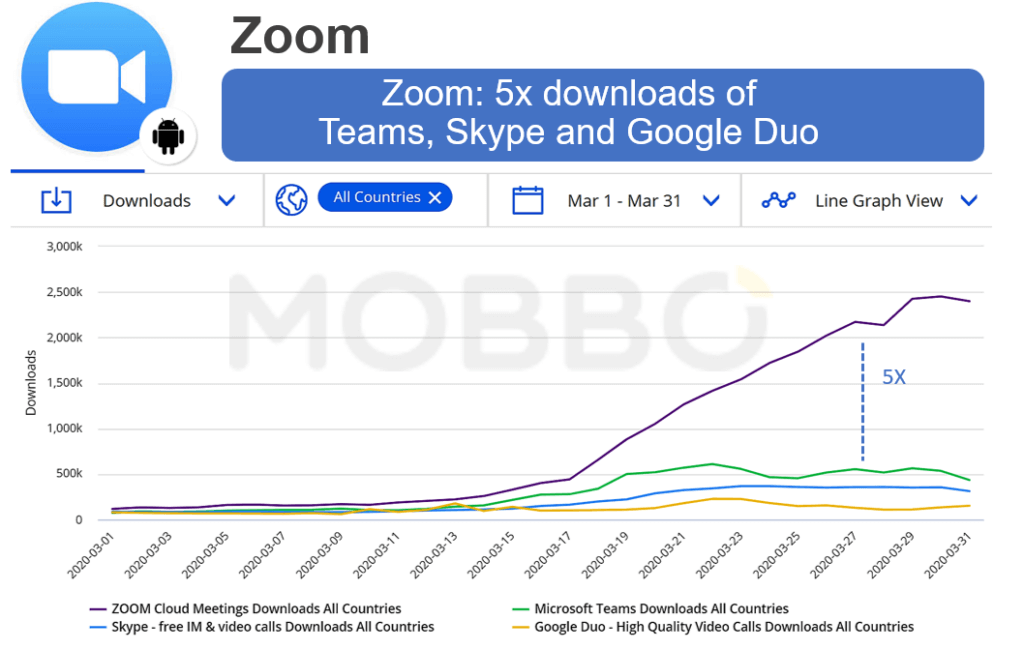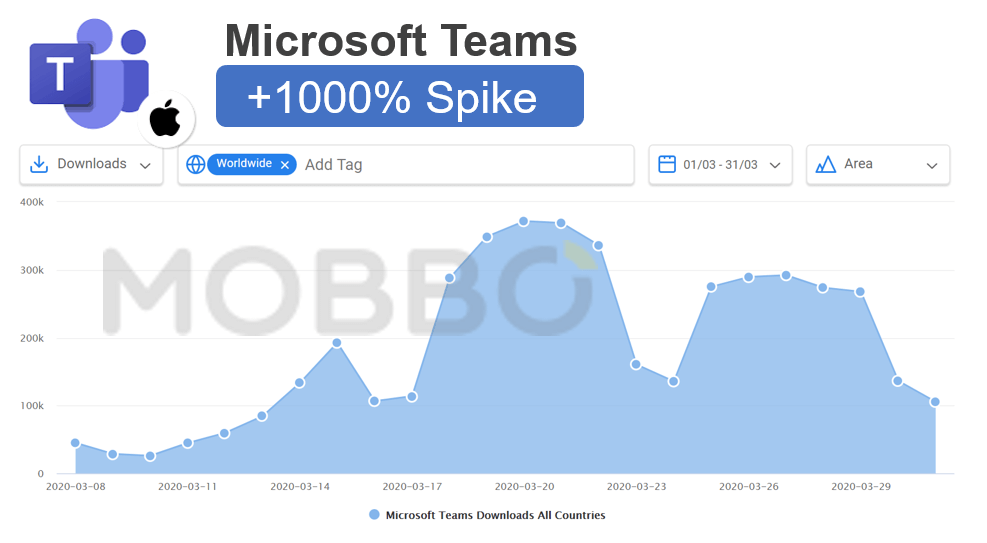With the COVID-19 pandemic becoming a new reality, it’s impossible not to see the effect it has on society. People have had to change their daily habits and adapt their lifestyles as quarantine and social distancing, as well as working from home (or not at all) and the lack of social events of any kind take hold.
When “trapped” inside four walls, technology is the logical solution to the increasing variety of needs. In the age of non-stop connectivity and easy access to information, the omnipresent smartphone is the gateway to the online world for everyone, ranging from kids and adults to organizations caught in the middle of the latest digital transformation efforts.
One particular aspect of user behavior seems to have taken off during the coronavirus: video calling. It’s quickly becoming one of the primary household digital activities, both for personal and professional uses. After all, communication is key to being productive and effective so in that spirit, we are going to take a look at 4 of the top players in the mobile app world during this time:
- Google Duo
- Microsoft Teams
- Skype
- Zoom
March Android Installs
The beginning of the month was rather uneventful, as you can see in the graph below. However, the second half of March was a particularly busy period, which can be attributed to widespread stay-at-home orders going into full effect, businesses moving their operations to home environments, and students attending school remotely.

Zoom emerged as a clear leader, registering more than 34 million downloads of its mobile app (Android and iOS combined) across the globe. Microsoft Teams and Skype experienced moderate spikes with the former clocking in just shy of 12.2 million downloads, while the latter reached slightly above 10.1 million monthly downloads. Google Duo didn’t show any meaningful growth in the 31-day period, totaling 6.3 million downloads for both platforms.
Let’s take a look at the performances based on the operating system.
Android stats
Zoom is the undisputed winner of the coronavirus pandemic, hands down, thanks to its 51.3 million active users and close to 18 million users on a weekly basis. In fact, with more than 17 million downloads from Play Store, it was the second most downloaded mobile app worldwide, with only the social media app TikTok rivaling its newly found cultural role.
Being both a productivity tool and family-friendly is largely what drove Zoom’s explosive growth, going from 117,000 daily installs on March 1 and gradually growing over the first half of the month, finally skyrocketing mid-March. During the last week, the app reached an astonishing number of almost 2.5 million users for three consecutive days (many of whom were first-time users) or, in other words – an increase of 2100% compared to the beginning of the month.
If Zoom has become the moniker for video conferencing, then Microsoft Teams can be called ‘the Zoom alternative’ – or at least that’s what our data shows.
Focused primarily on the workplace and the longstanding Office productivity software suite, the tech giant’s messaging and collaboration app established itself as Zoom’s top competitor with close to 7 million downloads during March, amounting to 12.3 million monthly active users. During its peak time, Microsoft Teams had an increase of 600% (100k downloads during the first week vs 600k on March 22), dropping to a still commendable 400% increase at the end of the month.
A veteran of online communication software, Skype doesn’t need any special introduction. The Microsoft-owned app was on par with its younger brother Microsoft Teams, adding up to almost 7 million downloads. Skype has had steady growth since mid-March, reaching approximately 500% more downloads before starting to slightly descend toward the final days of the month.
As for the massive number of monthly and weekly active users (223 million and 78 million, respectively) compared to Zoom and Microsoft Teams, Skype has the benefit of coming preinstalled on a big chunk of Android-operated devices, which explains the difference between overall and March data and why it’s well ahead of its two competitors in that area.
It would be unfair to call Google Duo the loser of this overview, especially when you consider it has more than 450 million monthly active users and a third of it dialing in every week. Just like Skype, it comes preinstalled on the majority of Android devices, which is arguably a huge advantage.
As for those that didn’t have it by default, Google Duo began the month at a steady pace with about 70,000 daily installs. As you can see below, it spiked several times before reaching the ultimate two-day peak during which it registered a 300% increase in downloads. Overall, the app saw a 200% surge from start to finish.
iOS stats
Zoomhad a similar performance on iOS as to that on Android with close to 17.1 million downloads, some 30k or so more. The Zoom effect was strong on iPhones and iPads as the app had a 10x increase by the end of March, registering almost 800,000 daily installs.
As opposed to its relatively balanced performance on Android, Microsoft Teams had significantly more peaks and valleys on iOS. Still, 5.4 million downloads is an impressive number for Microsoft on an Apple platform, with the third week of March (when video calling usage in general simply burst) recording 10 times more downloads per day compared to the start of the month.

Skype had a strong iOS streak, demonstrating the company’s ability to entice users even after all these years and ‘new kids on the block’. The app displayed encouraging results with 3.2 million global downloads and a roughly 500% increase over the course of the month.
Judging by the data, it took some time for most iOS users to warm up to Google Duo. Google’s offering took the better part of the month to go from 22k daily installs on March 1 to 50k on March 20, from which the app managed to clock in at almost 100k daily installs on March 31 – a 500% increase. While the total of 1.6 million monthly downloads is only half of the number of downloads we see for Duo on Android, it’s a very respectable growth considering it’s a rival platform.
Conclusion
Those would be the March trends for the four video calls apps. The numbers don’t lie – all four apps have shown substantial growth this past month. As expected, Android is the dominant platform, thanks to its 72.26% share of the market compared to iOS’ 27.03%.
For instance, Android users downloaded Google Duo and Skype twice as many times as they did on iOS with Microsoft Teams and especially Zoom, enjoying an even performance download-wise on both platforms. Also, it shouldn’t be a surprise that apps primarily aimed at business use are experiencing the biggest surges due to radical transformation of work these days.
So what can we expect next?
From a user standpoint, there are plenty of apps (and time) to go through, especially since new players are entering this fruitful market. Zoom is the app to beat at the moment, completely taking over the video calling ecosystem and inserting ‘Zoom call’ into the daily vocabulary. Until that happens, we can expect the reigning king to put even more distance between its competitors.
It is our forecast here at Mobbo that a March-like rush in downloads will sustain for a little while longer and then decline as most users will already have the apps installed. It’s possible that users separate their personal and professional needs and opt for other apps who enable video calls like the ones we left out for this report: Facebook Messenger, WhatsApp, Tango, and more. Time will tell, and we’ll be tracking.
About the data
All of the information stated in this report stems from Mobbo’s proprietary sales intelligence software. Mobbo measures the entire mobile world and monitors the technology stacks of over 3 million apps.
Do you want to track the performance of your app vs your competitors?
Need some valuable insights that will help you make the right calls?
Hit us up for a demo and full introduction of Mobbo’s platform.
Schedule a Demo